- Home
- F. Scott Fitzgerald
Complete Works of F. Scott Fitzgerald UK (Illustrated) Page 2
Complete Works of F. Scott Fitzgerald UK (Illustrated) Read online
Page 2
“Well, I couldn’t help it, could I?”
“So mama said for me to wait till ha’past five. We’ll catch the bobs before it gets to the Minnehaha Club, Amory.”
Amory’s shredded poise dropped from him. He pictured the happy party jingling along snowy streets, the appearance of the limousine, the horrible public descent of him and Myra before sixty reproachful eyes, his apology — a real one this time. He sighed aloud.
“What?” inquired Myra.
“Nothing. I was just yawning. Are we going to surely catch up with ‘em before they get there?” He was encouraging a faint hope that they might slip into the Minnehaha Club and meet the others there, be found in blasé seclusion before the fire and quite regain his lost attitude.
“Oh, sure Mike, we’ll catch ‘em all right — let’s hurry.”
He became conscious of his stomach. As they stepped into the machine he hurriedly slapped the paint of diplomacy over a rather box-like plan he had conceived. It was based upon some “trade-lasts” gleaned at dancing-school, to the effect that he was “awful good-looking and English, sort of.”
“Myra,” he said, lowering his voice and choosing his words carefully, “I beg a thousand pardons. Can you ever forgive me?” She regarded him gravely, his intent green eyes, his mouth, that to her thirteen-year-old, arrow-collar taste was the quintessence of romance. Yes, Myra could forgive him very easily.
“Why — yes — sure.”
He looked at her again, and then dropped his eyes. He had lashes.
“I’m awful,” he said sadly. “I’m diff’runt. I don’t know why I make faux pas. ‘Cause I don’t care, I s’pose.” Then, recklessly: “I been smoking too much. I’ve got t’bacca heart.”
Myra pictured an all-night tobacco debauch, with Amory pale and reeling from the effect of nicotined lungs. She gave a little gasp.
“Oh, Amory, don’t smoke. You’ll stunt your growth!”
“I don’t care,” he persisted gloomily. “I gotta. I got the habit. I’ve done a lot of things that if my fambly knew” — he hesitated, giving her imagination time to picture dark horrors — “I went to the burlesque show last week.”
Myra was quite overcome. He turned the green eyes on her again. “You’re the only girl in town I like much,” he exclaimed in a rush of sentiment. “You’re simpatico.”
Myra was not sure that she was, but it sounded stylish though vaguely improper.
Thick dusk had descended outside, and as the limousine made a sudden turn she was jolted against him; their hands touched.
“You shouldn’t smoke, Amory,” she whispered. “Don’t you know that?”
He shook his head.
“Nobody cares.”
Myra hesitated.
“I care.”
Something stirred within Amory.
“Oh, yes, you do! You got a crush on Froggy Parker. I guess everybody knows that.”
“No, I haven’t,” very slowly.
A silence, while Amory thrilled. There was something fascinating about Myra, shut away here cosily from the dim, chill air. Myra, a little bundle of clothes, with strands of yellow hair curling out from under her skating cap.
“Because I’ve got a crush, too — “ He paused, for he heard in the distance the sound of young laughter, and, peering through the frosted glass along the lamp-lit street, he made out the dark outline of the bobbing party. He must act quickly. He reached over with a violent, jerky effort, and clutched Myra’s hand — her thumb, to be exact.
“Tell him to go to the Minnehaha straight,” he whispered. “I wanta talk to you — I got to talk to you.”
Myra made out the party ahead, had an instant vision of her mother, and then — alas for convention — glanced into the eyes beside. “Turn down this side street, Richard, and drive straight to the Minnehaha Club!” she cried through the speaking tube. Amory sank back against the cushions with a sigh of relief.
“I can kiss her,” he thought. “I’ll bet I can. I’ll bet I can!”
Overhead the sky was half crystalline, half misty, and the night around was chill and vibrant with rich tension. From the Country Club steps the roads stretched away, dark creases on the white blanket; huge heaps of snow lining the sides like the tracks of giant moles. They lingered for a moment on the steps, and watched the white holiday moon.
“Pale moons like that one” — Amory made a vague gesture — “make people mysterieuse. You look like a young witch with her cap off and her hair sorta mussed” — her hands clutched at her hair — “Oh, leave it, it looks good.”
They drifted up the stairs and Myra led the way into the little den of his dreams, where a cosy fire was burning before a big sink-down couch. A few years later this was to be a great stage for Amory, a cradle for many an emotional crisis. Now they talked for a moment about bobbing parties.
“There’s always a bunch of shy fellas,” he commented, “sitting at the tail of the bob, sorta lurkin’ an’ whisperin’ an’ pushin’ each other off. Then there’s always some crazy cross-eyed girl” — he gave a terrifying imitation — “she’s always talkin’ hard, sorta, to the chaperon.”
“You’re such a funny boy,” puzzled Myra.
“How d’y’ mean?” Amory gave immediate attention, on his own ground at last.
“Oh — always talking about crazy things. Why don’t you come ski-ing with Marylyn and I to-morrow?”
“I don’t like girls in the daytime,” he said shortly, and then, thinking this a bit abrupt, he added: “But I like you.” He cleared his throat. “I like you first and second and third.”
Myra’s eyes became dreamy. What a story this would make to tell Marylyn! Here on the couch with this wonderful-looking boy — the little fire — the sense that they were alone in the great building —
Myra capitulated. The atmosphere was too appropriate.
“I like you the first twenty-five,” she confessed, her voice trembling, “and Froggy Parker twenty-sixth.”
Froggy had fallen twenty-five places in one hour. As yet he had not even noticed it.
But Amory, being on the spot, leaned over quickly and kissed Myra’s cheek. He had never kissed a girl before, and he tasted his lips curiously, as if he had munched some new fruit. Then their lips brushed like young wild flowers in the wind.
“We’re awful,” rejoiced Myra gently. She slipped her hand into his, her head drooped against his shoulder. Sudden revulsion seized Amory, disgust, loathing for the whole incident. He desired frantically to be away, never to see Myra again, never to kiss any one; he became conscious of his face and hers, of their clinging hands, and he wanted to creep out of his body and hide somewhere safe out of sight, up in the corner of his mind.
“Kiss me again.” Her voice came out of a great void.
“I don’t want to,” he heard himself saying. There was another pause.
“I don’t want to!” he repeated passionately.
Myra sprang up, her cheeks pink with bruised vanity, the great bow on the back of her head trembling sympathetically.
“I hate you!” she cried. “Don’t you ever dare to speak to me again!”
“What?” stammered Amory.
“I’ll tell mama you kissed me! I will too! I will too! I’ll tell mama, and she won’t let me play with you!”
Amory rose and stared at her helplessly, as though she were a new animal of whose presence on the earth he had not heretofore been aware.
The door opened suddenly, and Myra’s mother appeared on the threshold, fumbling with her lorgnette.
“Well,” she began, adjusting it benignantly, “the man at the desk told me you two children were up here — How do you do, Amory.”
Amory watched Myra and waited for the crash — but none came. The pout faded, the high pink subsided, and Myra’s voice was placid as a summer lake when she answered her mother.
“Oh, we started so late, mama, that I thought we might as well — “
He heard from below the shrieks of laught
er, and smelled the vapid odor of hot chocolate and tea-cakes as he silently followed mother and daughter down-stairs. The sound of the graphophone mingled with the voices of many girls humming the air, and a faint glow was born and spread over him:
“Casey-Jones — mounted to the cab-un
Casey-Jones — ‘th his orders in his hand.
Casey-Jones — mounted to the cab-un
Took his farewell journey to the prom-ised land.”
SNAPSHOTS OF THE YOUNG EGOTIST
Amory spent nearly two years in Minneapolis. The first winter he wore moccasins that were born yellow, but after many applications of oil and dirt assumed their mature color, a dirty, greenish brown; he wore a gray plaid mackinaw coat, and a red toboggan cap. His dog, Count Del Monte, ate the red cap, so his uncle gave him a gray one that pulled down over his face. The trouble with this one was that you breathed into it and your breath froze; one day the darn thing froze his cheek. He rubbed snow on his cheek, but it turned bluish-black just the same.
The Count Del Monte ate a box of bluing once, but it didn’t hurt him. Later, however, he lost his mind and ran madly up the street, bumping into fences, rolling in gutters, and pursuing his eccentric course out of Amory’s life. Amory cried on his bed.
“Poor little Count,” he cried. “Oh, poor little Count!”
After several months he suspected Count of a fine piece of emotional acting.
Amory and Frog Parker considered that the greatest line in literature occurred in Act III of “Arsene Lupin.”
They sat in the first row at the Wednesday and Saturday matinees. The line was:
“If one can’t be a great artist or a great soldier, the next best thing is to be a great criminal.”
Amory fell in love again, and wrote a poem. This was it:
“Marylyn and Sallee,
Those are the girls for me.
Marylyn stands above
Sallee in that sweet, deep love.”
He was interested in whether McGovern of Minnesota would make the first or second All-American, how to do the card-pass, how to do the coin-pass, chameleon ties, how babies were born, and whether Three-fingered Brown was really a better pitcher than Christie Mathewson.
Among other things he read: “For the Honor of the School,” “Little Women” (twice), “The Common Law,” “Sapho,” “Dangerous Dan McGrew,” “The Broad Highway” (three times), “The Fall of the House of Usher,” “Three Weeks,” “Mary Ware, the Little Colonel’s Chum,” “Gunga Din,” The Police Gazette, and Jim-Jam Jems.
He had all the Henty biasses in history, and was particularly fond of the cheerful murder stories of Mary Roberts Rinehart.
School ruined his French and gave him a distaste for standard authors. His masters considered him idle, unreliable and superficially clever.
He collected locks of hair from many girls. He wore the rings of several. Finally he could borrow no more rings, owing to his nervous habit of chewing them out of shape. This, it seemed, usually aroused the jealous suspicions of the next borrower.
All through the summer months Amory and Frog Parker went each week to the Stock Company. Afterward they would stroll home in the balmy air of August night, dreaming along Hennepin and Nicollet Avenues, through the gay crowd. Amory wondered how people could fail to notice that he was a boy marked for glory, and when faces of the throng turned toward him and ambiguous eyes stared into his, he assumed the most romantic of expressions and walked on the air cushions that lie on the asphalts of fourteen.
Always, after he was in bed, there were voices — indefinite, fading, enchanting — just outside his window, and before he fell asleep he would dream one of his favorite waking dreams, the one about becoming a great half-back, or the one about the Japanese invasion, when he was rewarded by being made the youngest general in the world. It was always the becoming he dreamed of, never the being. This, too, was quite characteristic of Amory.
CODE OF THE YOUNG EGOTIST
Before he was summoned back to Lake Geneva, he had appeared, shy but inwardly glowing, in his first long trousers, set off by a purple accordion tie and a “Belmont” collar with the edges unassailably meeting, purple socks, and handkerchief with a purple border peeping from his breast pocket. But more than that, he had formulated his first philosophy, a code to live by, which, as near as it can be named, was a sort of aristocratic egotism.
He had realized that his best interests were bound up with those of a certain variant, changing person, whose label, in order that his past might always be identified with him, was Amory Blaine. Amory marked himself a fortunate youth, capable of infinite expansion for good or evil. He did not consider himself a “strong char’c’ter,” but relied on his facility (learn things sorta quick) and his superior mentality (read a lotta deep books). He was proud of the fact that he could never become a mechanical or scientific genius. From no other heights was he debarred.
Physically. — Amory thought that he was exceedingly handsome. He was. He fancied himself an athlete of possibilities and a supple dancer.
Socially. — Here his condition was, perhaps, most dangerous. He granted himself personality, charm, magnetism, poise, the power of dominating all contemporary males, the gift of fascinating all women.
Mentally. — Complete, unquestioned superiority.
Now a confession will have to be made. Amory had rather a Puritan conscience. Not that he yielded to it — later in life he almost completely slew it — but at fifteen it made him consider himself a great deal worse than other boys... unscrupulousness... the desire to influence people in almost every way, even for evil... a certain coldness and lack of affection, amounting sometimes to cruelty... a shifting sense of honor... an unholy selfishness... a puzzled, furtive interest in everything concerning sex.
There was, also, a curious strain of weakness running crosswise through his make-up... a harsh phrase from the lips of an older boy (older boys usually detested him) was liable to sweep him off his poise into surly sensitiveness, or timid stupidity... he was a slave to his own moods and he felt that though he was capable of recklessness and audacity, he possessed neither courage, perseverance, nor self-respect.
Vanity, tempered with self-suspicion if not self-knowledge, a sense of people as automatons to his will, a desire to “pass” as many boys as possible and get to a vague top of the world... with this background did Amory drift into adolescence.
PREPARATORY TO THE GREAT ADVENTURE
The train slowed up with midsummer languor at Lake Geneva, and Amory caught sight of his mother waiting in her electric on the gravelled station drive. It was an ancient electric, one of the early types, and painted gray. The sight of her sitting there, slenderly erect, and of her face, where beauty and dignity combined, melting to a dreamy recollected smile, filled him with a sudden great pride of her. As they kissed coolly and he stepped into the electric, he felt a quick fear lest he had lost the requisite charm to measure up to her.
“Dear boy — you’re so tall... look behind and see if there’s anything coming...”
She looked left and right, she slipped cautiously into a speed of two miles an hour, beseeching Amory to act as sentinel; and at one busy crossing she made him get out and run ahead to signal her forward like a traffic policeman. Beatrice was what might be termed a careful driver.
“You are tall — but you’re still very handsome — you’ve skipped the awkward age, or is that sixteen; perhaps it’s fourteen or fifteen; I can never remember; but you’ve skipped it.”
“Don’t embarrass me,” murmured Amory.
“But, my dear boy, what odd clothes! They look as if they were a set — don’t they? Is your underwear purple, too?”
Amory grunted impolitely.
“You must go to Brooks’ and get some really nice suits. Oh, we’ll have a talk to-night or perhaps to-morrow night. I want to tell you about your heart — you’ve probably been neglecting your heart — and you don’t know.”
Amory thought how superficial
was the recent overlay of his own generation. Aside from a minute shyness, he felt that the old cynical kinship with his mother had not been one bit broken. Yet for the first few days he wandered about the gardens and along the shore in a state of superloneliness, finding a lethargic content in smoking “Bull” at the garage with one of the chauffeurs.
The sixty acres of the estate were dotted with old and new summer houses and many fountains and white benches that came suddenly into sight from foliage-hung hiding-places; there was a great and constantly increasing family of white cats that prowled the many flower-beds and were silhouetted suddenly at night against the darkening trees. It was on one of the shadowy paths that Beatrice at last captured Amory, after Mr. Blaine had, as usual, retired for the evening to his private library. After reproving him for avoiding her, she took him for a long tete-a-tete in the moonlight. He could not reconcile himself to her beauty, that was mother to his own, the exquisite neck and shoulders, the grace of a fortunate woman of thirty.
“Amory, dear,” she crooned softly, “I had such a strange, weird time after I left you.”
“Did you, Beatrice?”
“When I had my last breakdown” — she spoke of it as a sturdy, gallant feat.
“The doctors told me” — her voice sang on a confidential note — “that if any man alive had done the consistent drinking that I have, he would have been physically shattered, my dear, and in his grave — long in his grave.”
Amory winced, and wondered how this would have sounded to Froggy Parker.
“Yes,” continued Beatrice tragically, “I had dreams — wonderful visions.” She pressed the palms of her hands into her eyes. “I saw bronze rivers lapping marble shores, and great birds that soared through the air, parti-colored birds with iridescent plumage. I heard strange music and the flare of barbaric trumpets — what?”
Amory had snickered.
“What, Amory?”
“I said go on, Beatrice.”

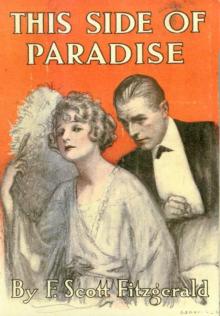 This Side of Paradise
This Side of Paradise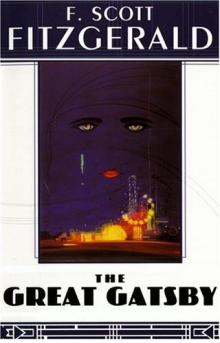 The Great Gatsby
The Great Gatsby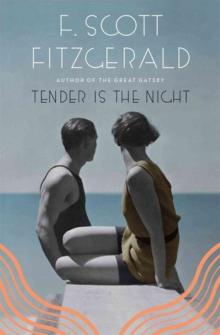 Tender Is the Night
Tender Is the Night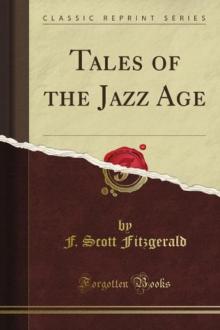 Tales of the Jazz Age (Classic Reprint)
Tales of the Jazz Age (Classic Reprint)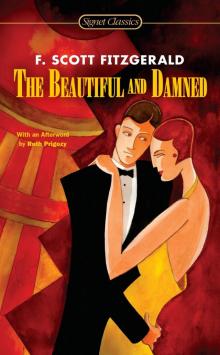 The Beautiful and Damned
The Beautiful and Damned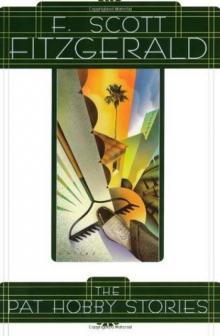 The Pat Hobby Stories
The Pat Hobby Stories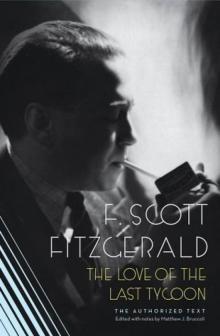 The Love of the Last Tycoon
The Love of the Last Tycoon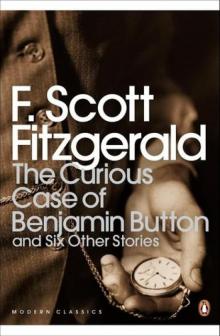 The Curious Case of Benjamin Button and Six Other Stories
The Curious Case of Benjamin Button and Six Other Stories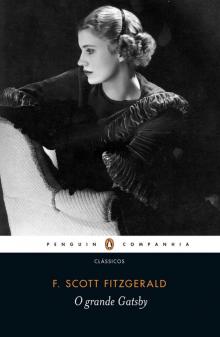 O Grande Gatsby (Penguin)
O Grande Gatsby (Penguin)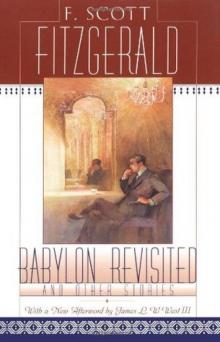 Babylon Revisited and Other Stories
Babylon Revisited and Other Stories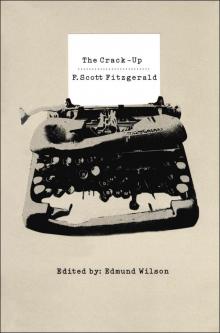 The Crack-Up
The Crack-Up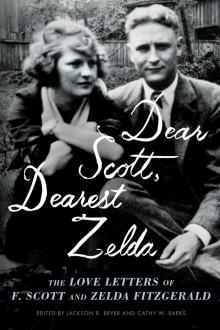 Dear Scott, Dearest Zelda
Dear Scott, Dearest Zelda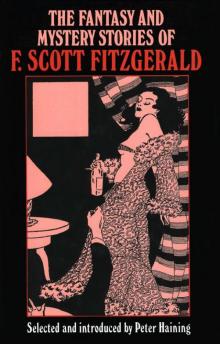 The Fantasy and Mystery Stories of F Scott Fitzgerald
The Fantasy and Mystery Stories of F Scott Fitzgerald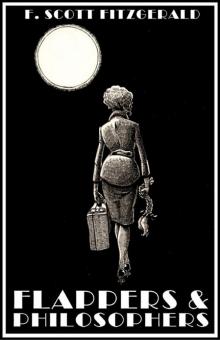 Flappers and Philosophers
Flappers and Philosophers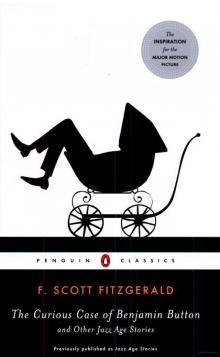 The Curious Case of Benjamin Button and Other Jazz Age Stories (Penguin Classics)
The Curious Case of Benjamin Button and Other Jazz Age Stories (Penguin Classics)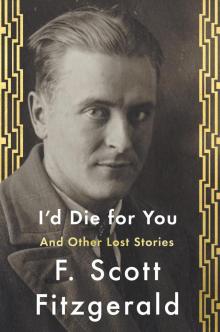 I'd Die For You
I'd Die For You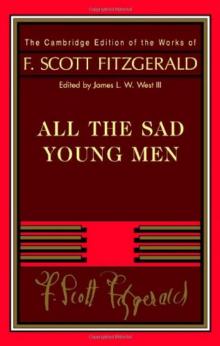 All the Sad Young Men
All the Sad Young Men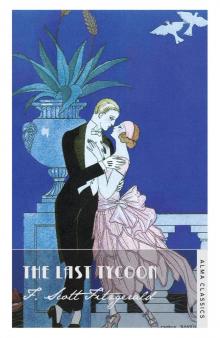 The Last Tycoon
The Last Tycoon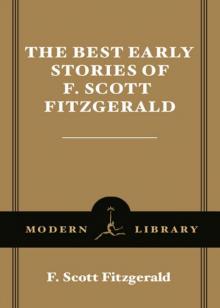 The Best Early Stories of F. Scott Fitzgerald
The Best Early Stories of F. Scott Fitzgerald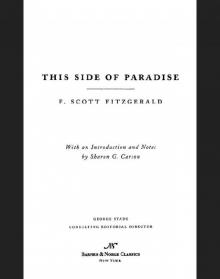 This Side of Paradise (Barnes & Noble Classics Series)
This Side of Paradise (Barnes & Noble Classics Series)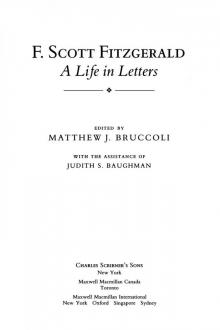 A Life in Letters
A Life in Letters Beautiful and Damned (Barnes & Noble Classics Series)
Beautiful and Damned (Barnes & Noble Classics Series)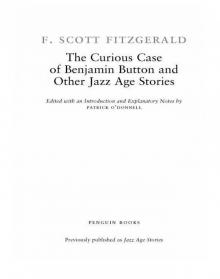 The Curious Case of Benjamin Button and Other Jazz Age Stories
The Curious Case of Benjamin Button and Other Jazz Age Stories Tales of the Jazz Age
Tales of the Jazz Age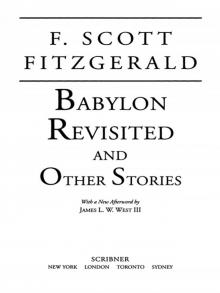 Babylon Revisited
Babylon Revisited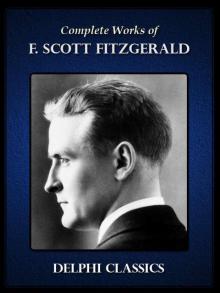 Complete Works of F. Scott Fitzgerald UK (Illustrated)
Complete Works of F. Scott Fitzgerald UK (Illustrated)